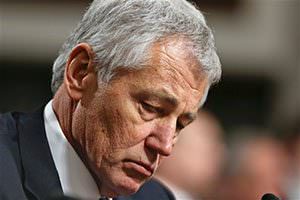From the Mind That Brought You Torture
Attorney General Alberto Gonzales suddenly finds himself in hot water over the U.S. attorneys scandal, but the truth is, the Senate should never have confirmed him in the first place.WASHINGTON — Everything we needed to know about Alberto Gonzales we learned before Feb. 3, 2005.
That’s the day the Senate, which spent more time in gauzy celebration of Gonzales’ Hispanic heritage than it did examining his legal prowess, voted to confirm him as attorney general.
We knew Gonzales’ chief qualification to be the nation’s top law enforcement official was that he had been — to use a phrase that apparently carries great weight inside the current Justice Department — “a loyal Bushie.” We knew this because loyalty to George W. Bush was really the only credential Gonzales’ public record offered.
We knew that while Gonzales was counsel to then-Texas Gov. Bush, the future attorney general managed to find no death row inmate worthy of clemency — no matter how severe his mental retardation or how incompetently the defendant was represented at trial. The Gonzales memos that would reach the governor’s desk before he proceeded to put a convict to death were cursory, at times only three pages in length.
Gonzales remained characteristically void of independent thought after he moved to the White House. There he would become, in effect, the lawyer who approved torture.
The Gonzales seal of approval resolved the dispute between the right-wing legal warriors in the Justice Department and elsewhere in the administration who argued that the Geneva Conventions on the humane treatment of wartime detainees were antiquated relics lacking in relevance to the “war on terror.” This faction was in conflict with Colin Powell’s State Department and a good number of senior Pentagon lawyers, who warned that abandonment of international law would lead the United States down a trail of shame.
Gonzales sided with those who cleared the way for torture. He even argued that lifting the Geneva Conventions “substantially reduces the threat of domestic criminal prosecution under the War Crimes Act.” Really. He stated that the president could unilaterally waive requirements of international law that had been in place for decades, and so provide absolution in advance for those who might commit war crimes.
The torture memos were the focus of Gonzales’ Senate confirmation hearing, a marathon of extraordinary obfuscation even in a chamber well accustomed to it. When asked if any other world leader could legitimately torture U.S. citizens, Gonzales testified he didn’t know what law they would be bound by. The law, of course, is the Geneva Conventions.
Despite a paper trail that tied Gonzales to the legal justifications for the most egregious abuses the Bush administration has committed in pursuing its anti-terrorism goals, he was confirmed 60-36. Most Democrats took a stand against a discredited nominee. Republicans stood with him, unanimous in their acquiescence to the Bush White House. They vouched for Gonzales by recounting his life story, an up-by-the-bootstraps tale of a dirt-poor immigrant who rose to Harvard Law School and beyond. “He has lived the American dream!” then-Republican leader Bill Frist of Tennessee declared.
Since then, Gonzales has been predictably compliant when confronted with all manner of administration affronts to the law. The secret, warrantless surveillance of Americans’ phone calls and e-mails comes first to mind. He has stunned even Republicans with his bizarre ignorance of the Constitution — as he did when he testified in January that the right of habeas corpus, which protects Americans from being seized and held without being able to contest their confinement in court, doesn’t exist. “There is no express grant of habeas in the Constitution,” Gonzales declared. To which Republican Sen. Arlen Specter of Pennsylvania stammered, “Wait a minute! Wait a minute!”
If the ham-handed firing of U.S. attorneys finally results in Gonzales’ departure, it will be as though his record of incompetent obedience to the White House was just fine, until now. It wasn’t. Nor was the Senate’s ardor for putting him in the nation’s top law enforcement job despite his controversial history.
The Gonzales imbroglio is another reminder of this president’s propensity to appoint hacks to high public office so long as they pass his loyalty litmus test. We’ve known this for years, too — heck-of-a-job Michael Brown at FEMA is merely the most famous. So it’s doubtful the White House will learn from this. The curve is too steep, the stubbornness too deep.
It’s really the Senate that shirked its duty when it confirmed Gonzales. The scandal of this attorney general’s tenure is as much theirs as it is his.
Marie Cocco’s e-mail address is [email protected].
© 2007, Washington Post Writers Group
Your support matters…Independent journalism is under threat and overshadowed by heavily funded mainstream media.
You can help level the playing field. Become a member.
Your tax-deductible contribution keeps us digging beneath the headlines to give you thought-provoking, investigative reporting and analysis that unearths what's really happening- without compromise.
Give today to support our courageous, independent journalists.





You need to be a supporter to comment.
There are currently no responses to this article.
Be the first to respond.